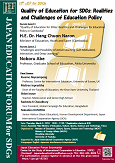Japan Education Forum for Sustainable Development Goals (15th JEF for SDGs)
Japan Education Forum for Sustainable Development Goals (15th JEF for SDGs)
Quality of education carried over to SDGs as one of the critical agendas from EFA, and education can be considered to “ensure inclusive and equitable quality and effective learning outcome” in SDGs. In other words, the goal is to broaden opportunities by linking learning outcomes — obtaining knowledge and skills, including non-cognitive ones — to employability.
Education in Japan has also changed with the trends of the times. For example, in 1983, an education guideline was changed to aim at “fostering student ability to learn by themselves,” and it was the beginning of the “Yutori Education” era in which the amount of content taught in schools was reduced. Because of the worsening results of the OECD student Programme for International Student Assessment (2003), the learning content was increased again in 2008.
Then, recently, the themes of valuing cultural diversity, inquiry-based/problem-solving “self-motivated, interactive, and deep learning” have garnered attention rather than simply acquiring “knowledge,” and the curriculum guideline was revised.
In developing countries, quality of education has been on the agenda for a long time, and education policy is often affected by the prevailing regime and donors of the time. For example, school enrollment in many developing countries has been improved thanks to previous initiatives; however, only 70 % of children in low income countries would have completed primary education by 2030. (In one country in Sub-Saharan Africa, gross enrollment rate for preschool reaches 100%, but the net enrollment rate for primary education is only 80 %.) Learning outcomes have more issues, including traditional curriculum and large class sizes, luck of national standard licensed teachers, and physical infrastructure such as unmaintained school buildings.
Therefore, this year’s JEF for SDGs will highlight the realities and challenges of education policies in Japan and developing countries by exploring quality of education for which SDGs are aiming. We look forward to welcoming active participation from the floor.
PROGRAM
Theme: “Quality of Education for SDGs: Realities and Challenges of Education Policy”
Date: Thursday, March 8, 2018
Venue: Assembly Hall, Ministry of Education, Culture, Sports, Science and Technology
(2-2 Kasumigaseki, Chiyoda-ku, Tokyo, Japan) : Map
Organized by:
Ministry of Education, Culture, Sports, Science and Technology (MEXT)
Ministry of Foreign Affairs (MOFA)
Hiroshima University
University of Tsukuba
Supported by: Japan International Cooperation Agency (JICA)
*Languages: English-Japanese simultaneous interpretations
SCHEDULE
| 9:30- | Registration |
| 10:00-10:20 | Opening Session:
Opening Address: Ministry of Education, Culture, Sports, Science and Technology, Japan Opening Address: Ministry of Foreign Affairs, Japan Special Address: Fabrizio Hochschild, Assistant Secretary-General for Strategic Coordination, United Nations *video |
| 10:20-10:50 | Keynote Speach: *video
“Quality of Education for SDGs: Realities and Challenges of Education Policy in Cambodia” H.E. Dr. Hang Chuon Naron Minister of Education, Youth and Sport (Cambodia) |
| 10:50-11:20 | Keynote Speech: *video (Japanese only)
“Challenges and Possibilities of Active Learning (Self-Motivated, Interactive, and Deep Learning)” Noboru Abe Professor, Graduate School of Education, Akita University (Japan) |
| 11:20-12:00 | Questions and Answers with Keynote Speakers |
| 12:00-13:30 | Lunch Break |
| 13:30-14:45 | Panel Session
Panelists: Kwame Akyeampong Professor, Center for International Education, University of Sussex, UK Maitree Inprasitha Dean of the Faculty of Education, the Khon Kaen University, Thailand Shion Inoue Teacher, NADA Junior and Senior High School Rasheda K Choudhury Vice President, Global Campaign for Education, Bangladesh Nobuhiro Kunieda Senior Advisor (Basic Education), Human Development Department, Japan International Cooperation Agency (JICA)
|
| 14:45-15:15 | Break |
| 15:15-16:15 | Open Floor Discussions, Questions and Answers |
| 16:15-17:00 | Wrap-up Session |
| 17:00 | Closing |
